Table of Contents
20 Trusted Sustainability Certifications: Your Guide to Eco-Friendly Shopping
This page may contain affiliate links. We may earn a commission on purchases, at no additional cost to you. Learn more →
One of the biggest challenges of starting a sustainable lifestyle is finding truly eco-friendly products. And that's where sustainability certifications come in handy. We’re often flooded with labels like “eco-friendly,” “biodegradable,” “natural,” or “sustainable” everywhere we go, but how reliable are these claims? Unfortunately, many turn out to be misleading.
When we're just learning how to be more sustainable, opting for products with green claims and leafy imagery makes us feel good about our choices. However, not all companies live up to their promises. That's why it's so important to support brands that truly back their claims with real efforts.
The good news is that sustainability certifications are our best allies to verify a company's claims.
When I began my sustainability journey, I was overwhelmed by how many certifications and standards there are. But luckily for you, I'm here to help. After conducting thorough research, I’ve compiled a list of the 20 best sustainability certifications to look for. Let's explore which ones you can trust!
Understanding Sustainability Certifications
What are Sustainability Certifications?
Sustainability certifications and standards are third-party verifications given to a company, organization, or product to back up its commitment to social or environmental aspects, including, but not limited to, good environmental practices, ethical sourcing, animal welfare, chemical safety, and energy efficiency. These are voluntary certification schemes that companies choose to opt for, adhering to specific guidelines in order to get certified by an accredited certifying body.
When you find a sustainable brand with a sustainability certification, you can trust its green claims and practices have been verified. After all, sustainably certified companies go through a certification process that involves meeting strict requirements and ongoing commitment. Let's take a closer look at these key steps that companies must complete to obtain a sustainability certification!
General Certification Process Overview
The reason I fully trust sustainable certifications is that I know certified companies are held to high standards of accountability and transparency, demonstrating their genuine commitment to sustainability. In general, most sustainably certified companies must:
-
Adhere to strict standards: Sustainably certified companies must adhere to stringent rules, including specific guidelines for the use of toxic chemicals in clothes, requirements for fair labor practices, waste management strategies, supply chain transparency, and more.
-
Undergo rigorous assessments: To get certified, companies must undergo regular audits and provide detailed documentation of their sustainability practices and environmental performance to verify compliance with the certification’s requirements.
-
Engage in ongoing monitoring: Actions speak louder than words, which is why most certification bodies require sustainably certified companies to commit to continuous improvement and undergo regular inspections to ensure compliance with the certification scheme over time.
Thanks to these verification steps, sustainability certifications help us identify ethical companies with a true commitment to environmental sustainability and social responsibility. But the real benefits of sustainability certifications go beyond this. Let’s explore how sustainability certifications help us take care of the environment, our health, and others!
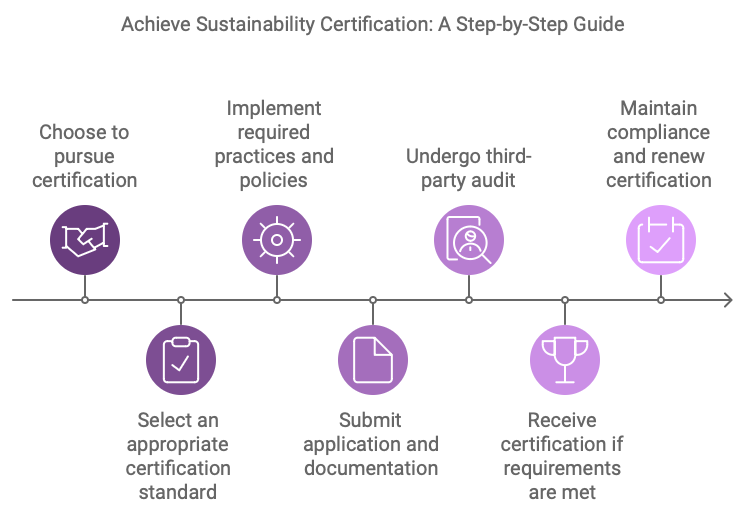
Benefits of Sustainability Certifications
A sustainability certification can have many benefits not just for you as a consumer, but also for the well-being of our planet, local communities, animals, and workers:
-
Environmental Impact: Sustainability certifications guarantee that companies are working towards minimizing environmental impact, conserving natural resources, preserving biodiversity, preventing pollution, and much more. When we choose sustainable products, we are promoting environmentally friendly practices.
-
Health & Safety: Choosing certified organic or non-toxic products can be a healthier option for you as well. These certifications tend to limit or prohibit harmful substances to prioritize consumer safety and help you choose healthier products.
-
Animal Well-being: Many certifications focus specifically on animal protection. If you're an animal lover, you can look for certified cruelty-free or vegan products that align with your values, as well as those that ensure the ethical treatment of animals in the textile industry.
-
Ethical Practices: You can also find ethical and fair trade certifications that guarantee workers' safety, promote good working conditions, prohibit child labor, and ensure fair wages throughout the supply chain.
Now that we understand what sustainability certifications are, the certification process, and their benefits, let's delve into the most common (and reliable) sustainable certifications you'll encounter!
Types of Sustainability Certifications
Sustainability professionals estimate that there are more than 400 voluntary sustainability standards worldwide. If there’s one thing I can guarantee, it’s that trying to learn and remember all of these certifications can definitely be overwhelming.
And frankly, no company can achieve to be certified by all of them.
A much better idea is to focus on the most trustworthy and widely recognized product certifications, which we've described below. And just to be clear: sustainability is a broad term and most certifications focus on different aspects of it. That’s why we’ve organized them into different types.
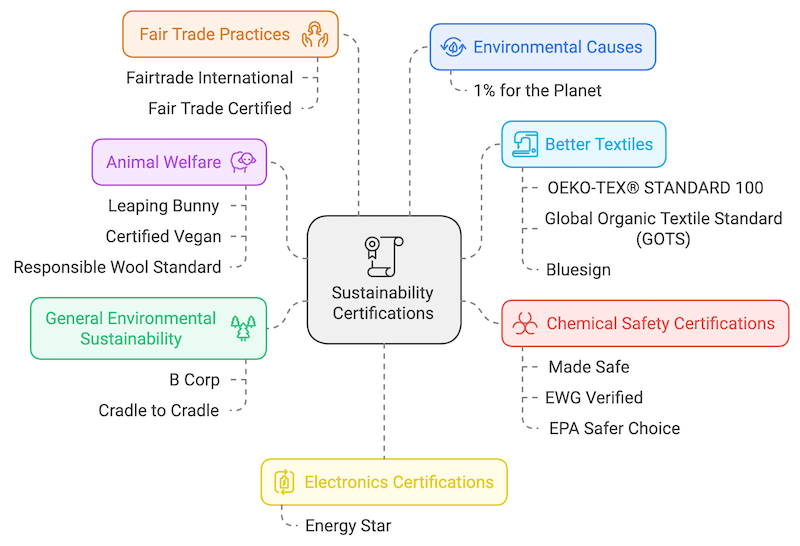
General Environmental Sustainability Certifications
First of all, we'll address some general certifications or programs. These certifications usually focus on more than one aspect of the company's sustainability practices:
B Corp

-
What It Certifies: Sustainable companies (not products)
-
Why It Matters: Certifies companies that balance purpose and profit
If you've been comparing sustainable brands, chances are you've encountered a few certified B Corps by now. The B Corp certification is one of the most prestigious —not to mention difficult— certifications to obtain in the sustainability space. Think of this sustainability certification as the cherry on top for a brand. To get certified, a company must meet high standards for social and environmental performance.
If you'd like to discover what makes B Corps different from traditional businesses, make sure to check out our Complete Guide to B Corps.
Cradle to Cradle
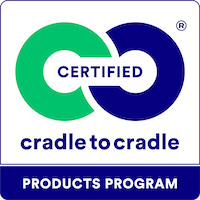
-
What It Certifies: Apparel, building materials, furniture, personal care items, and cleaning supplies
-
Why It Matters: Certifies products that are safe, circular, and responsibly made
While not as popular as the B Corp certification, the Cradle to Cradle certification is another widely recognized sustainability certification framework that demonstrates a product's sustainability and environmental responsibility. This sustainability certification assesses products across five categories: material health, product circularity, clean air and climate protection, water and soil stewardship, and social fairness. Simply put, this certification awards products that prioritize human health, support the circular economy, prevent climate change, protect ecosystems, and promote fair business practices.
Environmental Causes
Multiple certifications demonstrate a brand's commitment to supporting environmental and social causes. Today, we'll talk about one you've probably seen on various websites:
1% for the Planet

-
What It Certifies: Brands (not products)
-
Why It Matters: Certifies companies that contribute to environmental charities
1% for the Planet is a sustainability certification that is given to companies that donate at least 1% of their gross sales to approved environmental charities. When you see the 1% for the Planet certification logo on a brand's website or product, you can rest assured that a fraction of your money will go to meaningful causes addressing common environmental issues. It's important to note that this sustainability certification only certifies the company’s philanthropic efforts, which does not necessarily mean that a company or its products are eco-friendly.
Animal Welfare
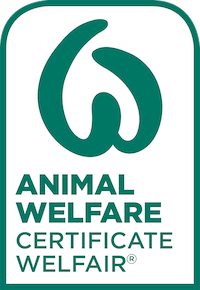
The well-being of animals is one of my top priorities when looking for sustainable products. If you want to protect our adorable, furry friends as well, opt for products with these trustworthy certifications:
Leaping Bunny

-
What It Certifies: Personal care, cosmetic, and cleaning brands (not individual products)
-
Why It Matters: Certifies that a company does not take part in animal testing
The Leaping Bunny certification is the most stringent and trusted standard for cruelty-free products. What I love about this sustainability certification is that it ensures companies do not engage in animal testing at any stage of production. This means a certified company's final products, formulations, and ingredients are not tested on animals. Similarly, a certified company can't request others to conduct tests on their behalf or sell their products in countries where animal testing is required by law. Keep in mind that this certification doesn't certify that a brand is vegan.
Certified Vegan
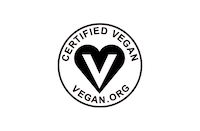
-
What It Certifies: Foods, drinks, mattresses, personal care, clothing, and household products
-
Why It Matters: Certifies products that are vegan and have not been tested on animals
If you prefer products that are free from both animal testing and animal ingredients, this sustainability certification will help you recognize vegan and cruelty-free products. Certified Vegan by Vegan Action guarantees that products are 100% free of animal-derived ingredients or components, even when it comes to cross contamination. In other words, if a vegan product is produced in the same machinery as non-vegan products, companies must demonstrate that the surface is thoroughly cleaned in between batches. Similarly, certified products must not have animal testing involved at any stage of production either.
Responsible Wool Standard
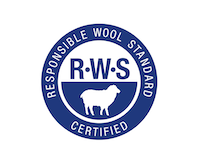
-
What It Certifies: Wool yarn, apparel made from wool
-
Why It Matters: Certifies that sheep are treated humanely
Wool is by far my favorite natural fiber for winter clothing, but I wouldn't feel comfortable wearing something that compromised an innocent animal's well-being. That's why I always seek sustainable brands that are certified by the Responsible Wool Standard. This sustainability certification guarantees that the wool comes from farms that treat animals with respect, have good environmental management practices, and adhere to the Five Freedoms of animal welfare.
Better Textiles
One of the problems with the fashion industry is that many brands are creating 'trendy' clothing while destroying our ecosystems along the way. And to make things worse, the final garments are often filled with toxic chemicals that mess up our hormones. Luckily, you can prevent all this by supporting the slow fashion movement, preferring sustainable materials, and looking for these trustworthy certifications:
OEKO-TEX® STANDARD 100

-
What It Certifies: Textiles and fabrics
-
Why It Matters: Certifies that a product is free from over 100 harmful substances
The OEKO-TEX Standard 100 is one of my favorite certifications to spot chemical-free clothing. When a clothing item carries the OEKO-TEX Standard 100, it means that it's free from harmful substances that could affect human health or the environment. What makes this sustainability certification truly shine is that every component of a certified textile article —including zippers, threads, and buttons— must be tested for harmful substances to guarantee the article is completely harmless to human health. However, this certification framework is focused solely on the finished products, not the raw materials.
Global Organic Textile Standard (GOTS)
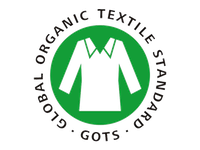
-
What It Certifies: Clothing, home textiles, mattresses, fabrics, personal care products
-
Why It Matters: Certifies products that contain 70% or more organic materials
While natural fibers are more popular than polyester among conscious consumers, they also come with an environmental cost. And that's something we can prevent with GOTS certified clothing. This stringent sustainability certification serves as a straightforward guide to identifying truly organic products, as only those with over 70% organic materials can get certified.
The GOTS certification monitors a product's entire supply chain, including processing, manufacturing, packaging, labeling, trading, and distribution. Similarly, certified products must adhere to strict guidelines regarding chemical use, raw materials, waste management, contamination risks, and more.
If you're thinking this certification scheme only applies to organic cotton, you'll be glad to hear it also covers other natural fibers like hemp, linen, and jute!
Bluesign
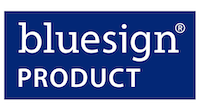
-
What It Certifies: Clothes, textiles
-
Why It Matters: Certifies products that are safe for the environment, workers, and customers
Another popular sustainability certification in the textile industry is the Bluesign label. This sustainability certification is awarded to products that meet strict safety and environmental standards throughout their supply chain, from raw materials to finished products. Unlike other certification schemes, the Bluesign® SYSTEM guarantees the safety of a product by removing harmful substances before they enter the supply chain.
Fair Trade Practices
We all deserve to enjoy a decent quality of life. Unfortunately, this is not the reality for many vulnerable workers around the globe. Let's explore some certifications to promote and guarantee equitable trade:
Fairtrade International
-
What It Certifies: Clothing, textiles, food, tea, coffee
-
Why It Matters: The certification ensures fairer terms of trade between farmers and buyers
When it comes to food and beverages, I prefer products carrying the Fairtrade International mark. Not only does this certification ban child labor and protect workers' rights, it also promotes transparency and provides a framework for small producers to build thriving farms. The Fairtrade International certification also addresses other environmental criteria, such as responsible water management and minimal use of pesticides.
Fair Trade Certified
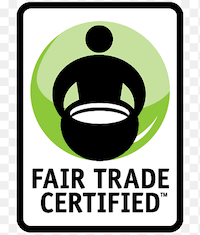
-
What It Certifies: Clothing, food, beverages
-
Why It Matters: Promotes safe working conditions and fair economic practices
Fair Trade Certified is another sustainability certification that helps us identify ethically-made products. Fair trade USA, the certifying body of the label, requires certified businesses to ensure safe working conditions, guarantee fair compensation, and protect the environment. This third party verification also includes guidelines to protect waterways, reduce waste, minimize greenhouse gas emissions, and reduce the use of toxic chemicals.
Chemical Safety Certifications
One of the first things I do before purchasing a new product is to check how safe it is, especially with everyday products. If we aim to have a healthy lifestyle, long-term exposure to harmful substances can diminish our efforts. So, let's check some of the most trustworthy certifications for non-toxic products:
Made Safe
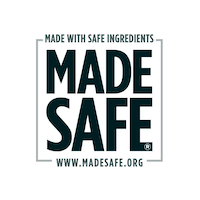
-
What It Certifies: Apparel, bedding, personal care, childcare items
-
Why It Matters: Certifies a product is free from over 6,500 harmful substances
As someone who cares about the safety of my products, I can't recommend the Made Safe seal enough. This rigorous third party verification guarantees a certified product is free from over 6,500 known or probable carcinogens, endocrine disruptors, toxins, hazardous flame retardants, high-risk pesticides, toxic solvents, and harmful VOCs.
EWG Verified
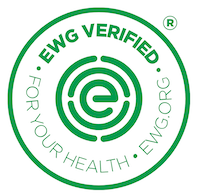
-
What It Certifies: Skincare, personal care, hair care, cleaning products
-
Why It Matters: Certifies products that meet the organization’s strict standards for health
When it comes to personal care products, I put my full trust in the EWG Verified mark. You might know The Environmental Working Group for its Skin Deep database, a guide to safer personal care products. But this non-profit also certifies products that are free from any ingredients on EWG's "Unacceptable" list, which includes ingredients with health, ecotoxicity, and/or contamination concerns.
EPA Safer Choice
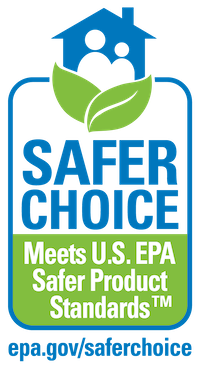
-
What It Certifies: Cleaning, household, and personal care products
-
Why It Matters: Certifies products that are safer for human health and the environment
What I love about the EPA Safer Choice label is that it goes above and beyond to certify products that are made with safe ingredients without compromising on performance. When you find a product with this sustainability certification, you can feel confident it's safe for you, your family, pets, and the environment.
Electronics Certifications
If you're on the hunt for new home appliances, look for products with this sustainability certification:
Energy Star

-
What It Certifies: Home appliances, electronics, lighting, heating and cooling
-
Why It Matters: Certifies products that use less energy than conventional options
The Energy Star label is given to products that meet strict energy efficiency criteria set by the US Environmental Protection Agency. This sustainability certification helps us identify home appliances and electronics that match or exceed the quality of conventional options while using less energy!
Green Building & Environmental Design
If you work in construction or want to promote healthier cities, it's worth learning about this certification:
Leadership in Energy and Environment Design (LEED)
-
What It Certifies: Green buildings, communities, healthy cities
-
Why It Matters: Evaluates the environmental performance of a building
The LEED certification is run by the U.S. Green Building Council (USGBC), the certifying body. This sustainability certification is a rating system that assigns different levels to certified green buildings: platinum, gold, silver, and certified LEED. The certification measures the environmental performance of new and existing buildings based on criteria such as materials, emissions, renewable energy, and more.
Forestry Product Certifications
Deforestation is one of the most alarming environmental issues around the world. Globally, around 10 million hectares of forest are lost every year. An easy way to make sure our purchases aren't promoting mass deforestation is to look for the following sustainability certifications:
Forest Stewardship Council (FSC)
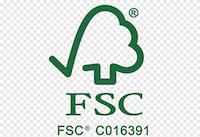
-
What It Certifies: Forestry products such as paper and wood products
-
Why It Matters: The certification promotes more sustainable forest management practices
You've probably seen the FSC logo on sustainable brands' paper and cardboard packaging. That's because the Forest Stewardship Council’s certification guarantees a product's forest-based materials come from responsibly managed forests. The Forest Stewardship Council also focuses on the restoration of forests, the protection of indigenous rights and endangered species, the promotion of workers' well-being, and the restriction of hazardous pesticides.
Rainforest Alliance Certified
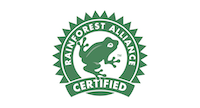
-
What It Certifies: Agricultural products, forestry products, tourism businesses
-
Why It Matters: Promotes environmental responsibility, social equity, and economic viability
Have you ever encountered this cute little frog on a product's packaging? In case you didn't know, the Rainforest Alliance label guarantees the sustainable sourcing of raw materials. In fact, certified products must contain at least 90% of ingredients sourced from responsibly managed forests or farms. Additionally, the Rainforest Alliance certification seeks to improve farmers' lives and help them adapt to climate change while protecting their forests and supporting local communities.
Roundtable on Sustainable Palm Oil (RSPO)
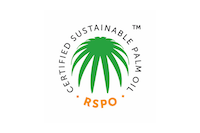
-
What It Certifies: Palm oil used in food and personal care products
-
Why It Matters: Certifies that palm oil is produced sustainably
The production of palm oil is often linked to large-scale deforestation and biodiversity loss. To prevent this, we can seek brands using sustainably sourced palm oil that's certified by the Roundtable on Sustainable Palm Oil. The RSPO monitors all parts of the supply chain, ensuring the production of palm oil didn't cause deforestation or affect local communities.
Climate Action
Let's check a fantastic certification to identify companies reducing their contribution to climate change:
Climate Neutral

-
What It Certifies: Brands in personal care, cleaning, apparel, technology, and more
-
Why It Matters: Ensures that certified companies take responsibility for their carbon emissions
The Climate Neutral label certifies companies that have measured, reduced, and offset the carbon emissions from all their activities throughout the entire supply chain, from sourcing materials to the moment the product reaches your hands. Sustainably certified brands are committed to reducing their environmental impact by minimizing their emissions and removing carbon from the atmosphere.
Final Thoughts
These trustworthy sustainability certifications will help you understand a brand's commitment to sustainability and trust their green claims.
But let's not forget that achieving a zero waste certification or certification of sustainability is not always possible for small businesses, especially due to the elevated costs of third party verifications and the advanced knowledge required to go through the certification process.
If you're interested in a sustainable brand that doesn't hold any sustainability certifications, take some time to learn more about the brand and consider other factors, such as its values, practices, materials, and packaging, to make an informed decision!

FAQs
Is there a certification for sustainability?
Yes, there are many certifications for sustainability! These range from broad certifications like B Corp, which evaluates a company's entire social and environmental impact, to more specific ones like GOTS for organic textiles or Energy Star for energy-efficient appliances. The right certification depends on the product or company you're looking at.
Does ISO 9001 cover sustainability?
While ISO 9001 is a valuable quality management certification, it doesn't directly address sustainability. ISO 9001 focuses on ensuring consistent quality in products and services. However, some of its principles, like continual improvement and evidence-based decision making, can indirectly support sustainability efforts. For direct sustainability management, look to certifications like ISO 14001 or B Corp instead.
Does ISO 14001 cover sustainability?
Yes, ISO 14001 is directly related to sustainability. It's an international standard for Environmental Management System (EMS). Companies with ISO 14001 certification have committed to minimizing their environmental impact, complying with applicable laws, and continually improving their environmental performance. While it doesn't guarantee a product is "green," it does show that a company is actively working to become more sustainable.
How many sustainability standards are there?
The world of sustainability certifications is vast and growing! According to the International Trade Centre's Standards Map, there are over 300 sustainability standards across different sectors and issues. However, if we include regional and industry-specific standards, the number could be well over 400.
This abundance of standards can feel overwhelming, which is why we've focused on 20 of the most reputable and widely recognized certifications in this article. Remember, it's not about finding a product with every possible certification. Instead, look for certifications that align with your values and the specific sustainability aspects you care about most.













